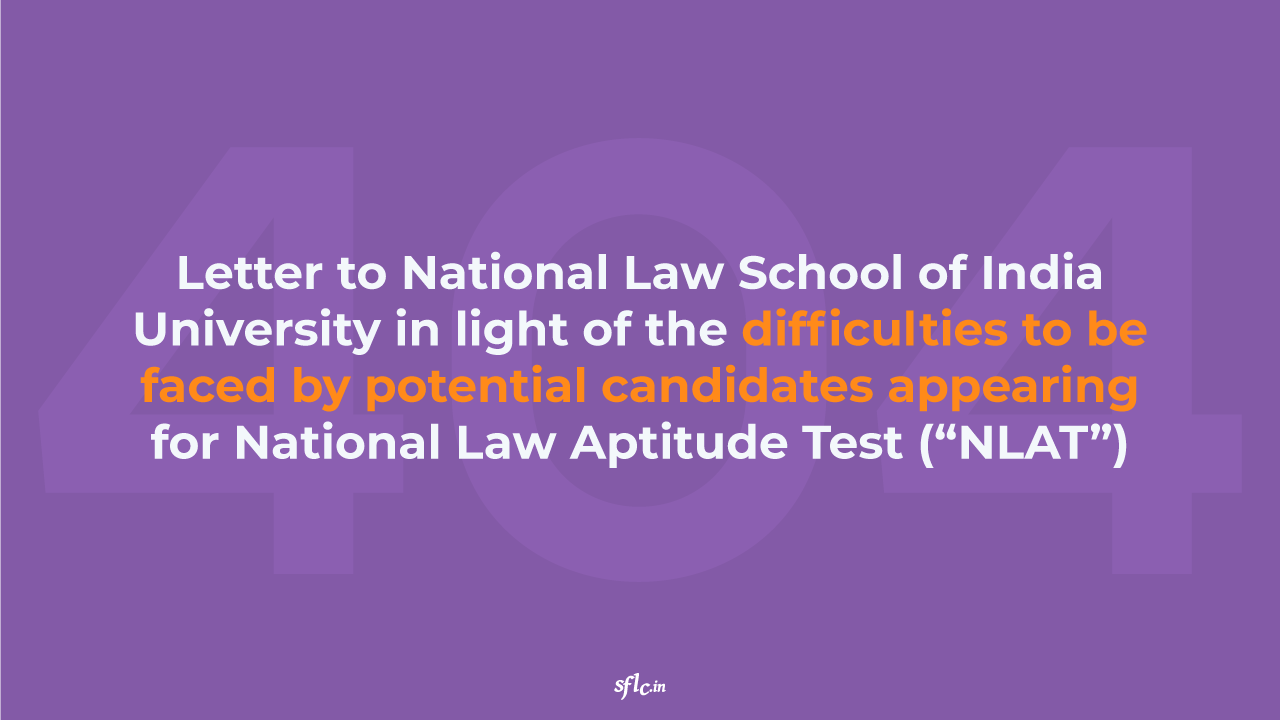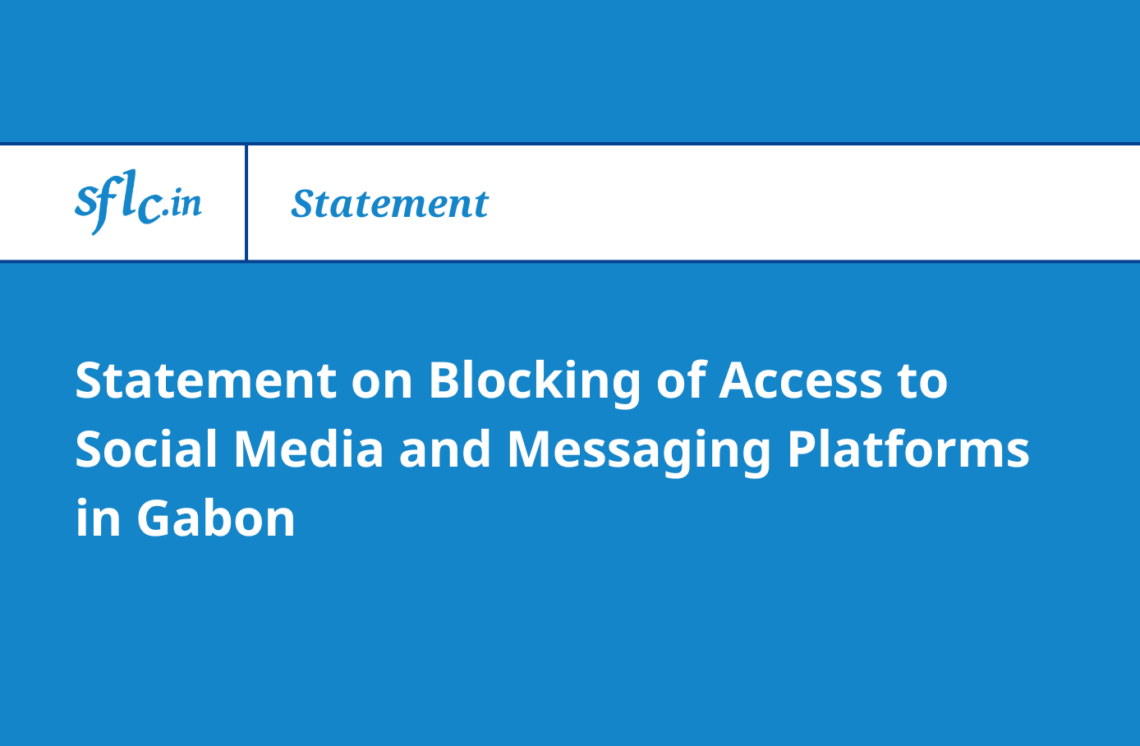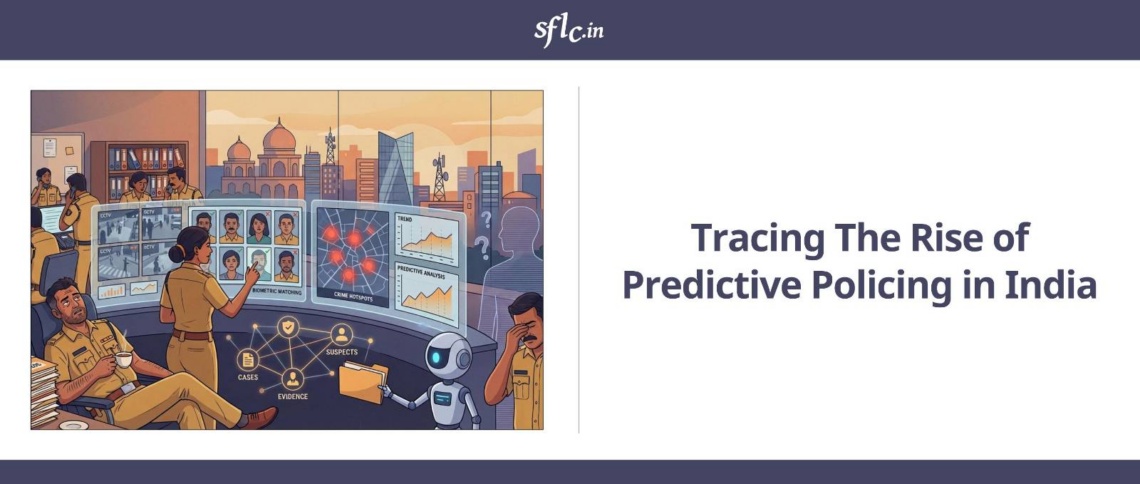SFLC.in wrote a Letter to National Law School of India University in relation to it’s decision to conduct its own admissions entrance test the National Law Aptitude Test (“NLAT”) and the problems and difficulties which would be faced by the potential candidates thereof.
While NLSIU has confirmed that it is “fully committed to delivering NLAT 2020 on time and in a student friendly manner”, there are serious issues which remain unaddressed, considering the dismal scenario of access to technical know-how, availability of technological devices and internet access in the country, specially in the rural areas.
In the letter We have urged NLSIU to rethink its decision and pay heed to the following recommendations by SFLC.in:
- Ensuring that the requirements for hardware and software for appearing in NLAT 2020 are vendor neutral.
- Ensuring a time frame for conducting NLAT which allows each candidate sufficient time to arrange or gain access to a laptop or a computer.
- Keeping adequate gap between the mock test and the NLAT 2020 to fix technical issues and in the interest of transparency and fairness, publish a list of problems/FAQs indicating the problems which were faced by the candidates in the Mock test and the steps taken by the university to overcome those issues.
- Facilitating training and guidance to each candidate with respect to technical know how and other information for appearing in the examination online.
- Ensuring that each candidate is given technical assistance/troubleshooting services during the course of his/her online examination.
- Enhancing the outreach of NLAT 2020 by increasing the number of test centers around the country to ensure the safety of potential candidates by reducing the travel time and distance to the minimum extent possible.
We sincerely hope that NLSIU pays heed to the concerns highlighted in this letter and will take into consideration the aforementioned recommendations, in the interest of the candidates participating in NLAT.
The letter sent to National Law School of India University can be found below:
September 9th, 2020
To,
The Registrar,
National Law School of India University,
Gnana Bharathi Main Road,
Teachers Colony,
Nagarabhavi,
Bangalore
Respected Sir,
Subject: “Issues surrounding NLAT 2020 in light of the prevalent digital divide in the country and the
difficulties to be faced by potential candidates”
Greetings from SFLC.IN!
SFLC.IN is the first Indian legal services organization that works exclusively on technology, law, and policy. As a not-for-profit organization engaged in the empowerment of Indian citizens about their digital freedom and rights, it operates as a collective bringing together different stakeholders to a common platform to further the cause of digital rights. SFLC.in promotes innovation and open access to knowledge by helping policy makers make informed and just decisions regarding the use and adoption of technology. As of 2020, SFLC.in is the only Indian organization to be inducted as a member of the IFEX, a global network to defend the right to freedom of expression and information.
We write this in relation to the decision of NLSIU to conduct its own admissions entrance test the National Law Aptitude Test (“NLAT”) and the problems and difficulties which would be faced by the potential candidates thereof.
While NLSIU has confirmed that it is “fully committed to delivering NLAT 2020 on time and in a student friendly manner”, there are serious issues which remain unaddressed, considering the dismal scenario of access to technical know-how, availability of technological devices and internet access in the country, specially in the rural areas.
It is important to mention at the outset that the browser requirement in the updated technical specification mentions Chrome browser as a recommendation. Chrome is a proprietary software and being a government institution, NLSIU should support Free and Open Source Software (FOSS) and specifically refrain from recommending a proprietary software.
There is a whole lot of young students who may not be familiar with technology and the technological interface which is to be used for appearing in NLAT and therefore they will not be able to appear for the exam without adequate training, technical guidance and support. In the current COVID-19 scenario, students around the country are struggling to adjust to the new normal and governments and educational institutions are struggling with internet connectivity issues to impart education to children, specially the ones who belong to less privileged backgrounds. In a meeting with the HRD Ministry and the State representatives, several states had pointed out concerns about the digital divide in education, coupled with the fact that several households did not own a digital device and lacked access to a robust internet connection. As per the 2017-18 National Sample Survey report, less than 15% of rural Indian households had access to the internet and only 11% of households possessed any kind of computer (including desktop computers, laptops, notebooks etc.).
Under such a situation, the methodology adopted by NLSIU is not in line with its objective to conduct the NLAT, “in the fairest and most accessible manner to all candidates.” Imposing such restrictions to sit for NLAT is unfair and unjust and it further propagates the prevalent elitism in top law schools in the country. It would therefore be unethical and inhumane on part of NLSIU if it fails to ensure that each potential candidate has an equal opportunity of appearing in the exam and sitting for it without facing any undue difficulty or hardship.
It is a strange dichotomy that an institution of excellence such as NLSIU which among other things, also seeks to impart constitutional values in the students, by virtue of conducing the NLAT in such an arbitrary and unfair manner, stands in violation of its own constitutional obligations as a government institution, violating right to equality under Article 14 and other rights under Article 21 of the Constitution of India. Digital divide is a huge challenge in India and despite being a premier law institution in the country, NLSIU has taken a step backwards in the fight against it.
One potential solution or a step forward in finding solutions to some of the issues is the Mock Test. The mock test is scheduled to be conducted on 9-11th September, right before NLAT which is being conducted on 12th September, 2020. It would be safe to assume that a mock test in such a situation would be conducted to learn about the issues students might face, percentage of students who were able to attend the exam and to make an attempt to fix those issues and find a solution to some of the related problems. It must be noted that keeping the NLAT on the very next day, defeats the very purpose of having a mock test as there is no window of opportunity for learning about such issues or finding a solution to them.
It must also be pointed out that the NLAT is being conducted at such short notice. It seems that NLSIU has presumed that each potential candidate has or will be able to gain access to a laptop/computer system/other device for appearing in the test or would be able to arrange access to it in such a short span of time. The prevalent COVID-19 situation has exemplified how the lack of access to technological aids to students has affected their studies. Students hailing from remote locations, villages and from tribal areas are already facing mobile and internet connectivity issues and an institution of eminence such as NLSIU is expected to be more empathetic and realistic to the concerns of all the students involved.
At this point it becomes relevant and imperative for us to reflect upon Mahatma Gandhi’s Talisman which states:
“Whenever you are in doubt, or when the self becomes too much with you, apply the following test. Recall the face of the poorest and the weakest man/woman whom you may have seen, and ask yourself, if the step you contemplate is going to be of any use to him/her. Will he/she gain anything by it? Will it restore him/her to a control over his/her own life and destiny?… Then you will find your doubts and your self melt away.”
In the spirit of inclusion outlined in the aforementioned words, it is clear that the approach adopted by NLSIU and the manner in which it seeks to conduct the NLAT, is discriminatory and undemocratic. Even if one single student is left behind or is put at a disadvantageous position as a consequence of the modality adopted by NLSIU for the said exam, it would be a travesty of justice and would reinforce inequality in an already elitist and unequal society. Institutions across the world have always stressed upon diversity and inclusion of students from the less privileged backgrounds as well. This act on part of NLSIU goes against that principle and it therefore merits serious reconsideration.
In light of the points mentioned in this letter, we therefore urge NLSIU to rethink its decision and pay heed to the following recommendations by SFLC.in:
i. Ensuring that the requirements for hardware and software for appearing in NLAT 2020 are vendor neutral.
ii. Ensuring a time frame for conducting NLAT which allows each candidate sufficient time to arrange or gain access to a laptop or a computer.
iii. Keeping adequate gap between the mock test and the NLAT 2020 to fix technical issues and in the interest of transparency and fairness, publish a list of problems/FAQs indicating the problems which were faced by the candidates in the Mock test and the steps taken by the university to overcome those issues.
iv. Facilitating training and guidance to each candidate with respect to technical know how and other information for appearing in the examination online.
v. Ensuring that each candidate is given technical assistance/troubleshooting services during the course of his/her online examination.
vi. Enhancing the outreach of NLAT 2020 by increasing the number of test centers around the country to ensure the safety of potential candidates by reducing the travel time and distance to the minimum extent possible.
We sincerely hope that NLSIU pays heed to the concerns highlighted in this letter and will take into consideration the aforementioned recommendations, in the interest of the candidates participating in NLAT.
Yours Sincerely,
Prasanth Sugathan
Legal Director,
SFLC.IN
prasanth@sflc.in




